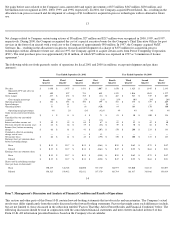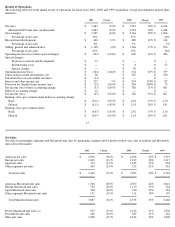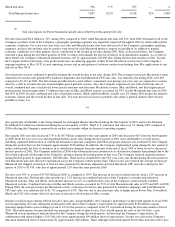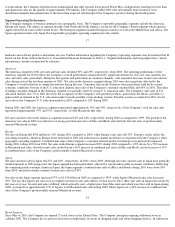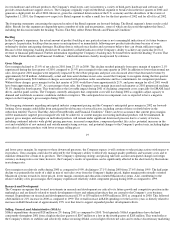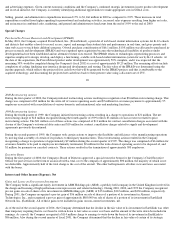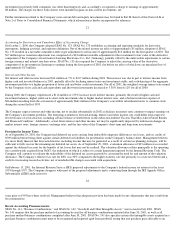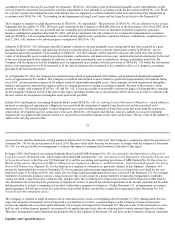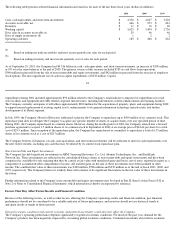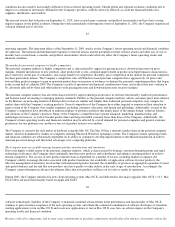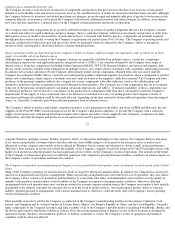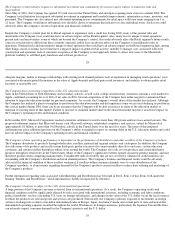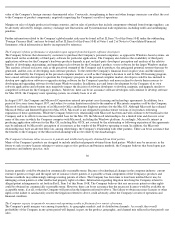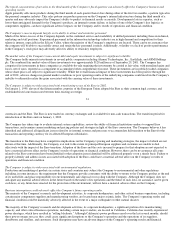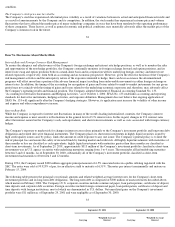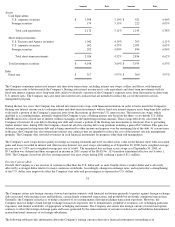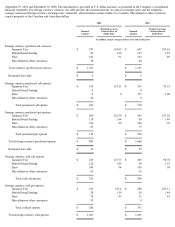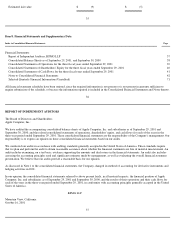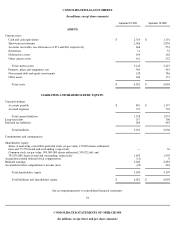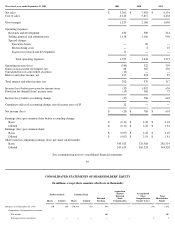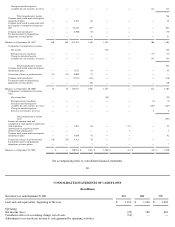Apple 2001 Annual Report Download - page 22
Download and view the complete annual report
Please find page 22 of the 2001 Apple annual report below. You can navigate through the pages in the report by either clicking on the pages listed below, or by using the keyword search tool below to find specific information within the annual report.
Company faces substantial inventory risk.
The Company records a write-down for inventories of components and products that have become obsolete or are in excess of anticipated
demand or net realizable value and accrues necessary reserves for cancellation fees of orders for inventories that have been canceled. Although
the Company believes its inventory and related provisions are adequate, given the rapid and unpredictable pace of product obsolescence in the
computer industry, no assurance can be given the Company will not incur additional inventory and related charges. In addition, such charges
have had, and may again have, a material effect on the Company's financial position and results of operations.
The Company must order components for its products and build inventory in advance of product shipments. Because the Company's markets
are volatile and subject to rapid technology and price changes, there is a risk the Company will forecast incorrectly and produce or order from
third parties excess or insufficient inventories of particular products. Consistent with industry practice, components are normally acquired
through purchase orders typically covering the Company's requirements for periods from 30 to 130 days. The Company's operating results and
financial condition have been in the past and may in the future be materially adversely affected by the Company's ability to manage its
inventory levels and respond to short-term shifts in customer demand patterns.
Future operating results are dependent upon the Company's ability to obtain a sufficient supply of components, some of which are in short
supply or available only from limited sources.
Although most components essential to the Company's business are generally available from multiple sources, certain key components
(including microprocessors and application specific integrated circuits ("ASICs")) are currently obtained by the Company from single or
limited sources. Some key components (including without limitation DRAM, TFT-LCD flat-panel displays, and optical and magnetic disk
drives), while currently available to the Company from multiple sources, are at times subject to industry wide availability and pricing pressures.
In addition, new products introduced by the Company often initially utilize custom components obtained from only one source until the
Company has evaluated whether there is a need for and subsequently qualifies additional suppliers. In situations where a component or product
utilizes new technologies, initial capacity constraints may exist until such time as the suppliers' yields have matured. The Company and other
producers in the personal computer industry also compete for various components with other industries (such as the cellular phone and
automotive industries) that have experienced increased demand for their products. The Company uses some components that are not common
to the rest of the personal computer industry (including certain microprocessors and ASICs). Continued availability of these components may
be affected if producers were to decide to concentrate on the production of components other than those customized to meet the Company's
requirements. If the supply of a key component were to be delayed or constrained on a new or existing product, the Company's results of
operations and financial condition could be adversely affected, depending on the time required to obtain sufficient quantities from the original
source, or, if possible, to identify and obtain sufficient quantities from an alternate source.
The Company's ability to produce and market competitive products is also dependent on the ability and desire of IBM and Motorola, the sole
suppliers of the PowerPC RISC-based microprocessor for the Company's Macintosh computers, to provide the Company with a sufficient
supply of microprocessors with price/performance features that compare favorably to those supplied to the Company's competitors by Intel
Corporation, and other developers and producers of microprocessors used by personal computers
27
using the Windows operating systems. Further, despite its efforts to educate the marketplace to the contrary, the Company believes that many
of its current and potential customers believe that the relatively slower MHz rating or clock speed of the microprocessors it utilizes in its
Macintosh systems compares unfavorably to those utilized by Windows-based systems and translates to slower overall system performance.
There have been instances in recent years where the inability of the Company's suppliers to provide advanced G4 and G3 microprocessors with
higher clock speeds in sufficient quantity has had significant adverse effects on the Company's results of operations. The inability in the future
of the Company to obtain microprocessors in sufficient quantities with competitive price/performance features could have an adverse impact on
the Company's results of operations and financial condition.
The Company is dependent on manufacturing and logistics services provided by third-parties, many of whom are located outside of the United
States.
Many of the Company's products are manufactured in whole or in part by third-party manufacturers. In addition, the Company has outsourced
much of its transportation and logistics management. While outsourcing arrangements may lower the fixed cost of operations, they also reduce
the Company's direct control over production and distribution. It is uncertain what effect such diminished control will have on the quality or
quantity of the products manufactured, or the flexibility of the Company to respond to changing market conditions. Moreover, although
arrangements with such manufacturers may contain provisions for warranty expense reimbursement, the Company may remain at least initially
responsible to the ultimate consumer for warranty service or in the event of product defects. Any unanticipated product defect or warranty
liability, whether pursuant to arrangements with contract manufacturers or otherwise, could adversely affect the Company's future operating
results and financial condition.
Final assembly of products sold by the Company is conducted in the Company's manufacturing facilities in Sacramento, California, Cork,
Ireland, and Singapore and by external vendors in Taiwan, Korea, Mexico, the People's Republic of China, and the Czech Republic. Currently,
many components of the Company's products and final assembly of all of the Company's portable products including PowerBooks, iBooks, and
the iPod is performed by third-party vendors in Taiwan. If for any reason manufacturing or logistics in any of these locations is disrupted by
regional economic, business, environmental, political, or military conditions or events, the Company's results of operations and financial
condition could be adversely affected.


